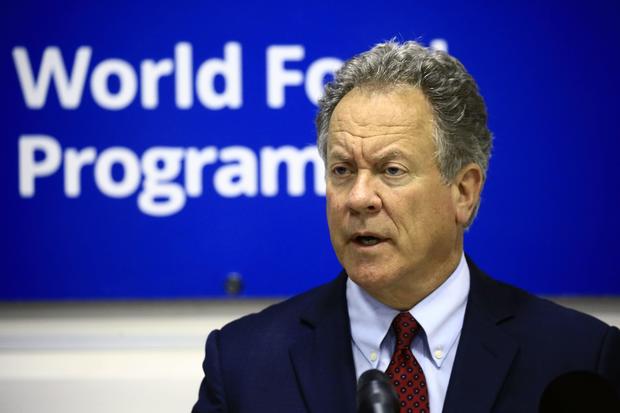World Food Program director David Beasley on coronavirus: "The worst is yet to come"
On top of the coronavirus pandemic, the world may see a global humanitarian catastrophe, including famine in three dozen countries — potentially the most serious crisis since World War II. Ports are closed and supply chains disrupted as a disaster looms for millions.
David Beasley, the executive director of the United Nations World Food Program and a former governor of South Carolina, said in an interview with CBS News that members of both parties in the U.S. have come together to help stave off poverty, starvation and instability, but he says more aid is needed to keep food supplies moving. He also spoke about the need for "common sense" on when to reopen the economy.
Beasley spoke with CBS News' Pamela Falk from his home in Society Hill, South Carolina, where he recently recuperated from a case of COVID-19 himself.
CBS News' Pamela Falk: You came down with coronavirus. Tell us what the experience was like.
David Beasley: You read all stories, then when it hits you, it's a whole different ballgame.
I've been lucky, in the sense that it never got so severe that I had to go to the hospital. But at the same time it didn't hit me for three days. It was real slight and went away completely ... it hit me with a little fever, aches and pains. And then I thought it was going away after three days, and then it … it just kept lingering for three straight weeks. ... Fortunately I never had respiratory issues. I was worried one particular day, but made a good turn, and it's behind me now.
I'm so grateful… that I can speak with experience about what I faced so that people can understand what this is all about.
Even when governors or leaders say we're going to open up, still use common sense. That's the key: use common sense, use the brain that God has given you. And be careful.
This is a deadly disease. Even if it's not deadly for you, you can give it to someone who might be elderly or with a pre-existing condition, and then that obviously is deadly.
The World Food Program warned that, in addition to the coronavirus pandemic, the world may see a global humanitarian catastrophe. What is your message to world leaders, to the private sector? What can be done?
Beasley: This is tragic. We feed about 100 million people on any given day, but 30 million depend on us 100%. So now with COVID, we've got an additional 130 million people bringing us to 265 million people literally marching to the brink of starvation.
We got to work out these issues immediately. Otherwise we're going to have famines unlike anything we've ever seen in history.
Number one: Let's end the wars right now. Please end the wars — that would be the biggest thing.
Number two: We need to pre-position about $1.9 billion worth of food … to advance that funding so we can pre-position it so that when supply chains begin to break down, people won't lose their lives because of what we do.
Number three: We need about $350 million so that we can move medical supplies, testing kits, doctors, nurses and health care professionals.
The last thing we need to do is keep the supply chain going because if you can't get the food out of a field to the market to the consumer, people will die.
I tell you, the worst is yet to come.
I'm so concerned about Africa. Obviously I'm concerned about our donor nations — that their economies get back to moving as quickly as they can, so that we can provide the monies that are going to be needed to stave off massive famine in many of these countries that depend on success in the economies of donor nations like the United States, like the U.K., like Germany.
Many Africans depend upon remittances from their friends and families from around the world, like from the United States. And if we start seeing in urban areas of Africa youth losing their jobs, and not having food, you're going to have riots.
Destabilization is going to be a game-changer. So we're trying to identify the hotspots upfront and see what we can do to come in with safety nets, but we're going to need funding to do that. If we don't, it'll be catastrophic.
Are you speaking to the U.S. administration, to the Trump administration, about keeping ports open?
Beasley: Yes, I've been talking to not just the U.S. administration but literally leaders from many countries all over the earth. And I can tell you … that the United States has been an extraordinary donor. In fact we get about $3.4 billion from the United States.
Republicans and Democrats, even though they seem to be fighting over everything, when it comes to food security foreign aid and stabilization, they have been absolutely remarkable and every leader that I have talked to, including the United States, is committed to working with us doing their dead-level best not to back down.
This is the 75th anniversary of the UN. Do you think [the next General Assembly, in September] could take place?
Beasley: This year is one of the most devastating years in the United Nations history. So this would be a year for everybody really coming together because COVID has transcended all borders around the world. So it'd be a great time for leaders to come together for a variety of reasons.
However, if COVID is still a contagious issue, I would imagine we might see the first UN General Assembly as a virtual show.
A final note: Asked about being back home in South Carolina to recuperate, Beasley said he's able to walk around and get fresh air. "My family's lived in this area since the early 1700s so we're an old family that came across like we were, we were immigrants, way back when," he said.




